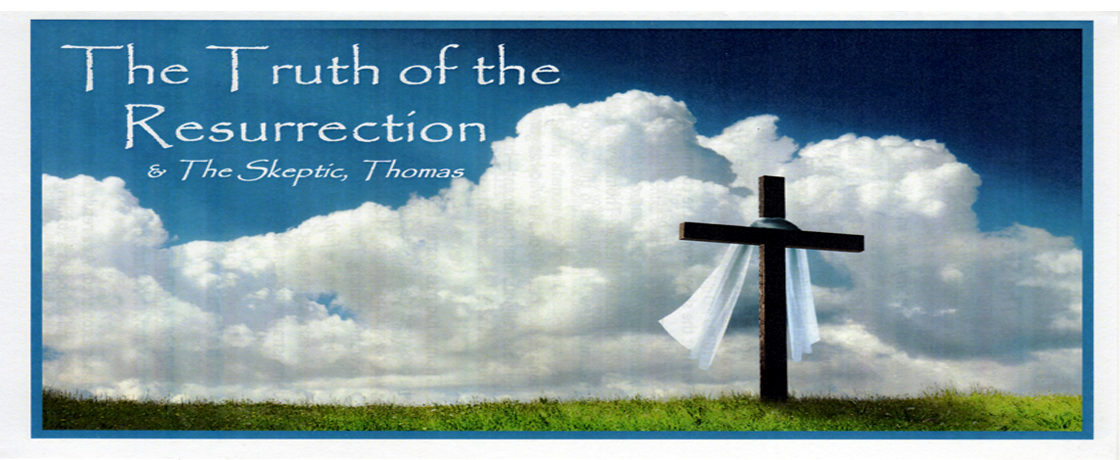The Truth of the Resurrection & The Skeptic, Thomas
The Truth of the Resurrection & The Skeptic, Thomas
John 20:25b Thomas said, “Unless I shall see in His hands the print of the nails, and put my finger into the print of the nails, and thrust my hand into His side, I will not believe.”
Jesus had been crucified. Then on that first Sunday evening, Jesus appeared to His apostles, but not to all twelve disciples. Judas was dead, and Thomas was absent.
A Disappointed Skeptic
This was not the skepticism of the committed philosophical materialist-—someone who believes that all that exists is matter, energy, space, and time, and that miracles are simply impossible. Instead, Thomas, was a devout first-century Jew. He believed in the God of the Bible.
Thomas’s skepticism is of one who has gone through stupendous religious disappointment—hurt and shocked so much, that he does not want to be blindsided again.
Thomas had passionately believed that Jesus was the promised Messiah. But now, Jesus is gone, and he believes there is no bringing Him back, and also no nobility in wishful thinking. Thomas wanted to distinguish between genuine faith and mere gullibility. He asks for the most personal and concrete demonstration he can think of, to prove it was Jesus.
The Praise of a Surprised Skeptic
John 20:28 And Thomas answered and said unto Him, “My Lord and my God!”
Thomas is astonished. As a result, he immediately praises, and he speaks a stunning confession.It is now the second Sunday after the resurrection, with similar circumstances: the apostles are in a house, and Jesus comes in. He knows what evidence Thomas demanded. Jesus said to him, “Put your finger here; see My hands. Reach out your hand and put it into My side. Stop doubting and believe.
His confession of, “My Lord and my God!” is a marvel on top of a marvel. He does not say, ‘Our Lord and our God,’ as if he were reciting some sort of liturgical slogan. His confession is intensely personal: “My Lord and my God!”
Christianity is not simply affirming that Jesus Christ is the Lord and God of the universe, but that in the most intimate sense He is the Christian’s Lord and God.
Why does he confess so much? One can easily imagine the nature of the probing reflections that occupied his mind and imagination throughout that week: “Jesus. Alive? It can’t be! I need some evidence.…He cannot possibly be alive.” In the matrix of such mental wrestling, Thomas is no doubt forced to think more deeply than before. He had progressed far enough in his understanding to grasp that if Jesus was truly alive, this was more, even, than a spectacular resurrection: It was the visitation of God Almighty.
The Witness of a Converted Skeptic
John 20:29 Jesus said unto him, “Thomas, because you have seen Me, you have believed. Blessed are they that have not seen and yet have believed.”
Some misunderstand this verse and think Jesus is saying that faith not based in signs, and perhaps not based in truth, is superior faith. The reason it is misinterpreted is because their word faith often carries a definition not found in the Bible. Today it often means something different. First, faith may function as a synonym for religion; that is, there are many “faiths,” there are many “religions.” Second, Faith is a sort of personal, subjective, religious choice. In that instance, it has nothing to do with truth or with what’s real.
The Truth of the Resurrection
I Corinthians 15:15 Yes, and we are found to be false witnesses of God, because we have testified of God that He raised up Christ, whom He did not raise up, if so it be that the dead rise not 1 7 and if Christ be not raised, your faith is vain; you are yet in your sins.
The apostle Paul argues that if Jesus has not risen from the dead, while you believe that He has risen from the dead, then your faith in Jesus’ resurrection is futile; it is worthless. One of the things that validates faith is the truthfulness and reliability of faith’s object. Faith is more than believing the truth. After all, the demons themselves believe that Jesus rose from the dead. Although saving faith is more than believing the truth, it is never less. That is why the Bible never urges us to believe something that may not be true.
The means by which we believers of later generations have access to the historical witnesses of the resurrected Jesus is through the written records the first generation left behind. Thomas’ doubt and belief is a part of this chain.
This is a revelation, a disclosure from God, that takes place in space-time history. The access to the historical elements of the Christian faith, the access to the truth of these elements that we have, is found in historical witnesses,
True Witnesses. May the truth of Christ’s Resurrection be understood and embraced in each of our lives. Faith includes both truth and a relationship with Him.

